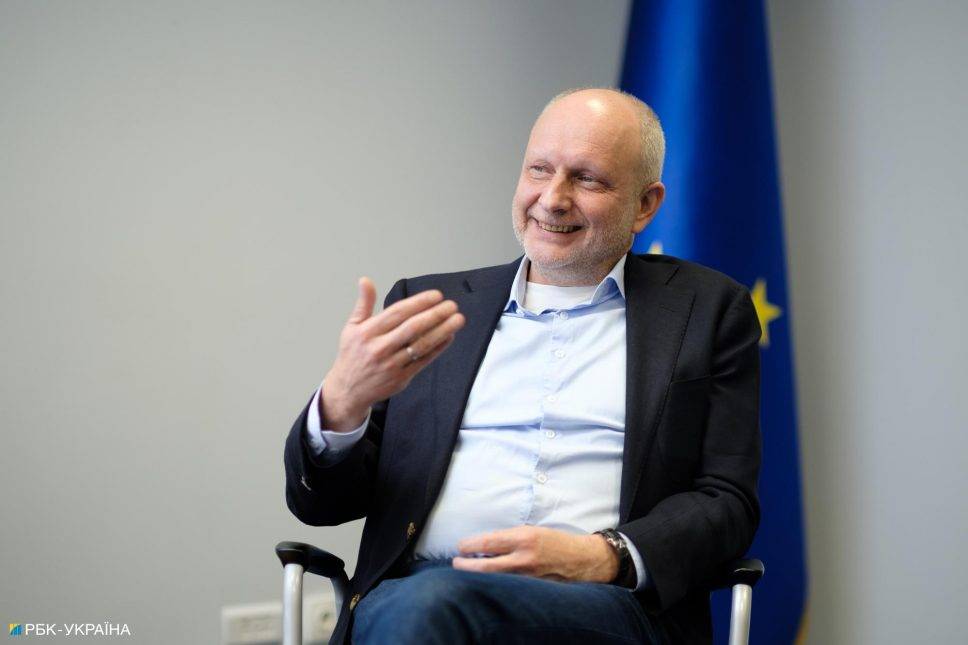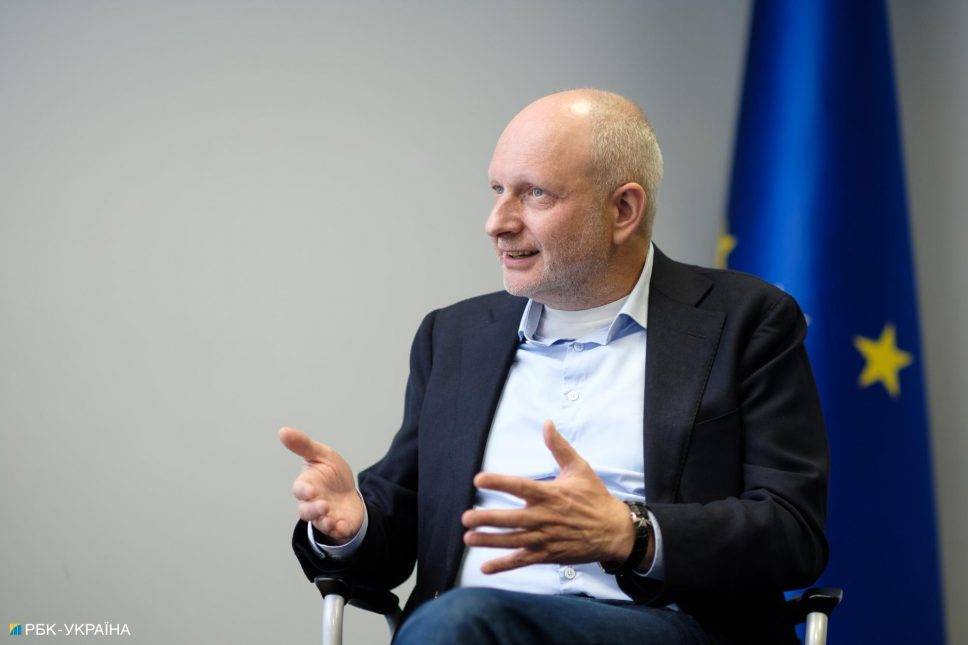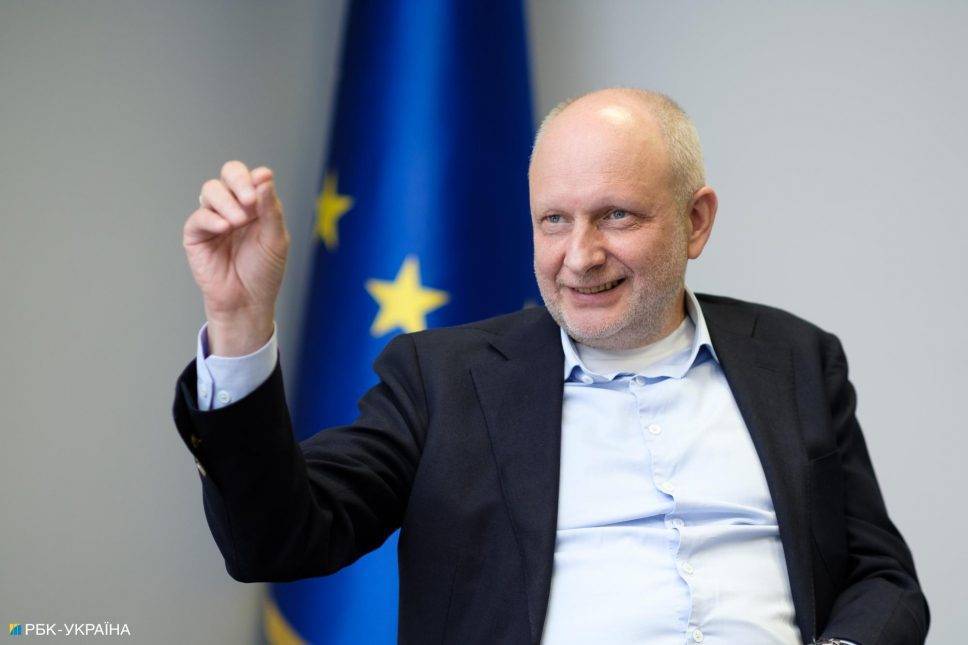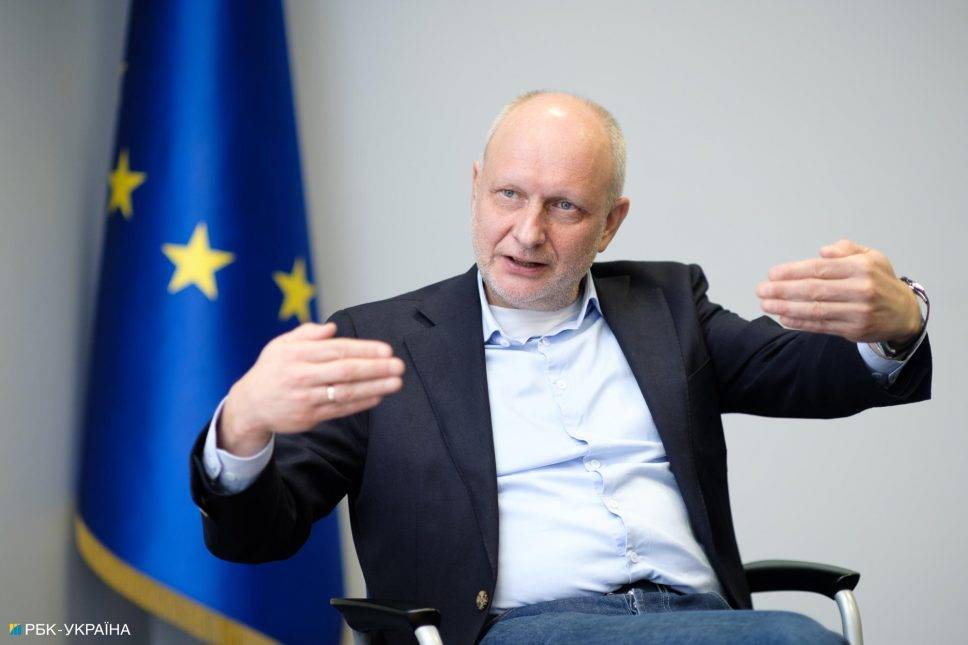
EU Ambassador Matti Maasikas: Ukraine needs to fight for support from ordinary Europeans
In an interview with RBC-Ukraine, Matti Maasikas, Head of the EU Delegation to Ukraine, spoke about sanctions against Russia, prospects for joining the European Union, EU financial and military assistance.
Sanctions against the Russian Federation are probably Ukraine’s second most important demands to Western partners, after weapons. The European Union has already approved seven packages of fairly tough sanctions and is preparing to adopt the eighth one, which will include new trade restrictions against the aggressor nation. However, the final decision on the new sanctions will have to wait a little longer.
Generally speaking, during the summer, many European media (with references to their sources) were assuring that the readiness to introduce new restrictions was modest in the EU, since the situation on the frontline had allegedly reached a dead end, and all effective pressures on the Russian Federation had already been used. However, it is now obvious that the advances of Ukraine on the battlefield and, above all, the new escalation by Moscow (the bogus referendums, annexations) still adrenalized Europeans to take new serious steps in response. And, as the EU Ambassador Matti Maasikas assures, the European Union will continue to support Ukraine in everything and until the very end, namely, to the victory.
– Mr. Ambassador, let’s start with sanctions. Will the new sanctions package be adopted on October 6-7 and what might it contain? In particular, regarding the further cut-off of Russian banks from SWIFT and price cap on Russian oil are of interest. And also, response to the recent developments: pseudo-referendums, mobilization, nuclear intimidation from the Russian Federation?
– What I can say now is that there are discussions between EU member states as the decision must be made unanimously. So, I won’t speculate now. But you have seen the EU’s determination to respond to the actions you have mentioned.
– To what extent true the reports of certain Western media can be that the EU ‘has no appetite for sanctions? Do you feel it?
– No. The European Union was able to adopt a range of rather tough sanctions over a few months because Russia’s actions had been so serious. You know what these sanctions were about. Disconnecting from SWIFT, which was considered impossible, expanding sanctions on the energy sector, which was also considered impossible. Freezing the assets of the Russian Central Bank, which were considered to be Putin’s war funds or his buffer for committing such acts. This is what has already been done.
The European Union demonstrated its determination and aptitude to respond to this very serious situation. There are some differences of opinion among the member states. Back in 2014, there were countries that said that, fundamentally, they did not believe in sanctions as a foreign policy tool. And there are those who say they cannot afford this, because they are dependent on certain imports from Russia. But, nevertheless, the EU member states have always demonstrated their remarkable capability.

– Actually, what is meant here is that there has been an opinion that it is necessary to focus on maintaining the existing sanctions and ensuring their enforcement instead of introducing new and serious sanctions.
– These things do not cancel each other. At least in some sanction rounds, along with the introduction of new ones, loopholes in the existing ones were also sealed. In other words, it is not something that cannot be done in parallel.
– Regarding the European Union’s unity on sanctions – we often see the problem of Hungary. Almost every time a new sanctions package is discussed, this country comes on the scene and says it disagrees with this, this and that. Is it possible to somehow solve this problem in principle, so that one country does not have a possibility to block the European sanctions processes?
– Most processes inside the EU are decided by a qualified majority. But each country joined the European Union voluntarily. It always takes a huge effort to reach unanimity and to engage everyone. And only at the very end, if this fails, a majority or qualified majority vote can take place. It often happens that, for internal political reasons, it is advantageous for the leadership of an individual EU member state to be against be able to show that they fought with all their might, but the decision was made by the majority at the end of the day.
When it comes to foreign policy, all decisions must be taken unanimously, and that is a powerful force. Because when everyone agreed, it is a joint and much more binding decision. This means that discussions sometimes take a very long time. Sanctions are the kind of thing one needs to take real action.
– And not just put them down on paper…
– Exactly. So, they all must apply them. Therefore, it is logical that it should be decided unanimously.
– How have various sanctions and embargoes already affected the European economy in terms of energy carriers and looking for alternatives to Russian supplies? In short, when will Russia stop to cash in on Europe and use energy as a weapon?
– Let me give you a counter example. As you are aware, when the invasion began in February, 40% of natural gas supplies to the EU came from Russia. It is now 9% with no formal sanctions on this. The EU understood and finally agreed that the Russian Federation was not a reliable supplier. The EU and its member states are making a concerted effort to completely get rid of Russian imports.
Here you have an example of how this full-scale war affected the position and economy of Europeans. I don’t think it’s appropriate to even start talking about how these sanctions can affect the EU economy. Here in Ukraine, people die every day on the front line, including civilians. These sanctions are tailored to impact Russia, and they are impacting heavily.
In your question, you are obviously alluding to how the Russian trade balance improved in the first half of the year, since, primarily because of the war, energy prices went up. First of all, Russia cannot buy much with this money, due to trade restrictions from the EU, USA, United Kingdom, and Japan.
Secondly, that is already over. In August, this trend changed quickly enough, and we are on target with our sanctions.

– How united is the European Union in confronting various forms of Russian blackmail, from energy to information? We see certain fluctuations in public opinion around some European countries regarding our war with Russia. The percentage of those who are willing to support us as much as we need it is still relatively high, but, nonetheless, it is slightly lower in many countries than in March or April.
– The European Union is absolutely united in its action. All decisions have been made unanimously. You are correct in suggesting that individual EU member states sense a varying degree of threat from the Russian propaganda, information manipulations and, frankly, lies.
For my native country, Estonia, – Russia, the Russian-speaking space, and Russian propaganda have always been a daily reality. Here is just a very personal remark – I think that growing up in the USSR, having lived the first 25 years of my life in the USSR, I am immune to Russian propaganda. I believe I can see it through.
In some countries further west, people may not even sincerely realise that a propaganda attack is already taking place. They have never faced such a thing. Let’s take, say, Ireland. Democracy has been there for a hundred years now. They never experienced the Nazi regime, they did not undergo the Soviet regime, which is good for them. And I understand when Irish people say they are completely surprised that this kind of news, arbitrary fake news, is well-targeted Russian propaganda. Since 2014, when awareness of this has begun to grow. The European External Action Service has had a dedicated unit that fights Russian propaganda and disinformation.
Again, you mentioned public opinion. It is fair to note that one of the main factors that contributed to the very rapid development of relations between the EU and Ukraine was favourable public opinion. When Ukraine’s candidate status was discussed, there was a number of member state leaders saying – my government is not yet inclined to unlock the EU enlargement prospects for any country, but in the case of Ukraine, I see that my people support this!
It is true that this support is not a given. You must fight for it every day. And your government is doing just that. President Zelensky addresses societies, parliaments, universities and political leaders of EU countries every day. And your actions speak louder than words. All these factors matter. But you are absolutely right – nothing about public opinion should be taken for granted.
– What you have just said very much resonates with what I already heard from some of our high-ranking officials. They told me: when we talk to people, to officials from Estonia, from Poland, from Lithuania, Latvia, it’s one thing, because they feel that this war is their own war. And if they give us any weapons, they defend themselves so that the Russian tanks are stopped at Kharkov, and not at Krakow. But when we talk, let’s say, with the French, Germans and further to the west, we see that they do not share the same sense that this war as theirs too. They say, if we give the Ukrainians a lot of tanks, then we will not have tanks for ourselves. Do you think this is true?
– Each country has its own assessment of security risks based on geography, neighbours, and historical experience. There is no secret here. I remember when I was still working as an Estonian diplomat, we had serious debates at the Ministry of Foreign Affairs. We need to be more active regarding North Africa, because it is important for our partners – France, Italy, Malta, etc. Perhaps it does not concern us so much, but still, it concerns our partners. Or take the migration crisis of 2015-2016. It affected nations on the EU borders, such as Italy, Greece, Malta, as well as transit countries, such as Hungary, destination countries, mainly Germany and Sweden. But in some Eastern European countries, ordinary people – I’m not talking about governments now, just about ordinary people – they said, where is that migration crisis?!!
You should take into account things that are important to your allies and show solidarity. But I want to emphasize – this war is unprecedented. It is not comparable with the examples I have given. What we have now is a nuclear power attacking its neighbour for no reason, in Europe. This is serious. This is the most serious crisis for absolutely every European country, regardless of whether the people there think that Russian tanks can come to their home tomorrow or not. The seriousness of the situation is recognized throughout the EU.

– To close the issue of sanctions, the EU has repeatedly promised to support Ukraine until the very end, until we win this war. Is this also true regarding sanctions?
– [We will help – editorial] with everything that will be needed. I sense that you are implying that European economic sanctions are imposed for a six-month period and should continue. I’m sure it will be the case based on the experience of the 2014 sanctions, the extension became easier and easier without much discussion. I cannot speculate on what may or may not happen in each specific case, but the package of not even sanctions, but general assistance to Ukraine from the EU has many components. Sanctions are one of the strong components. So, when we say we will support you to the end, that must include sanctions as well.
– Our senior officials say that negotiations on Ukraine’s accession to the EU can start at the very beginning of next year. According to Prime Minister Denys Shmyhal, we hope to complete this journey within two years. To many people, even in Ukraine, this seems way too optimistic. Do you agree?
– It is optimistic, energetic and decisive. And that’s the way we want it, right? EU enlargement is a performance-based process. The vast majority of what needs to be done depends on the candidate state. Earlier in our conversation, I already said how big this step was for the EU to have opened the European perspective to a new country and to have immediately granted it the candidate status. There were seven priority reforms connected with this decision. As a rule, those are prerequisites for obtaining the candidate status – you fulfil them, and you obtain the status. Ukraine was able to take two steps at the same time related to this decision on the reforms’ agenda. The next step is Ukraine’s homework on these reform areas, with our help, of course. The European Commission will then evaluate the progress made. For now, I can only quote the words of the President of the European Commission, Ursula von der Leyen, during her recent [September 15 – editorial] visit to Kyiv, ‘the evaluation will be next year, and then we will see’.
– But you are not going to evaluate our progress in these areas for now, are you?
– Not in a holistic and comprehensive way. No intellectual work is needed to ‘evaluate’ that Klymenko has been appointed as the head of the SAP. When the new head of NABU is nominated, an ‘evaluation’ will not be needed either.
– So, you can see this item has been fulfilled… That’s it! We just tick the box.
– Exactly! There is also a law on media. The recommendation suggests that it must comply with the EU Audiovisual Media Service Directive. You take the text of the Ukrainian law against the text of the EU directive, and it will be quite easy for you to compare them. The work is in progress continuously, that is, we are not saying we do not evaluate recording positive steps and great determination of the Ukrainian political community, which is the case indeed.
– Regarding the media bill – do you still think it complies with the EU directive?
– We are in constant liaison, and the Ukrainian authorities and politicians know very well what needs to be done. I will comment on this text when I see it prepared for the second reading. We are moving forward with this, but at the Ukrainian pace. Once the parliamentary committee and the Rada are ready, we will move it.
– What is the military and financial assistance that we may expect from the European Union in the short and medium terms? And could you explain how the European Peace Facility works?
– First of all, each individual EU member state may wish to provide military assistance on its own, on a bilateral basis, and many do so. As for military assistance from the European Union, it is financed from the European Peace Facility. This instrument has a funding cap for the period of 2021-2027. In today’s prices, this is EUR 5.7 billion. Within this amount, the member states decide that a certain funds can be spent to help Ukraine. As of today, this facility covers the costs of assistance to the Armed Forces of Ukraine in the total amount of EUR 2.6 billion. There may be more.
How the European Peace Facility works. Ukraine sends to Brussels, to the European External Action Service, a list of the arms needed. And then, one EU member state says, for instance, that it has such arms and can send them to Ukraine. Afterwards Brussels will pay this country for it, so Ukraine does not have to pay.
I would like to briefly remind you – last December, when the first disbursements were made to partner countries like Ukraine, there were huge, huge discussions. And in the end, EUR 31 million was allocated for Ukraine.
– What a great victory!
– Absolutely! 31 million euros – just imagine! [laughing – editorial]. And now we have EUR 2.6 billion.
– We already operate with billions.
– True! Remarkable progress was achieved! Again, due to the situation being so serious.

– Regarding financial assistance, as you know, Ukraine is almost completely dependent on its Western partners and friends in this aspect as well. As President Zelensky emphasized, we have a deficit of about 5 billion US dollars every month. Everyone understands that the war will not end tomorrow, so we will need this money month after month. How long can we count on your financial assistance?
– I myself cannot put any specific figures or give timeline. EU, USA, and UK declared that they would stand with Ukraine till the end. This gives optimism.
As far as I know, if the EU provides the remaining EUR 3 billion in macro-financial assistance, then the budget should be balanced this year. Discussions may begin about the next year. I can’t make any assumptions as to how it is going to work out, but of course we are aware of the situation. No donor alone can fulfil these commitments.
– The last question is regarding our refugees in the EU. In your opinion, is the EU going to fully integrate these people, will they continue to receive assistance as refugees, or would you expect these people to return home as soon as possible?
– This is a very challenging situation. There are factors that you mentioned, but the key factor is unpredictability. Most people want to return to Ukraine, and I would want that, because Ukraine needs these people. But they don’t know when. Many have already returned. September 1 when the school year began, that was a defining moment. Many Ukrainian mothers continue to engage their children in the Ukrainian education, even from abroad.
Ukrainians are very hardworking. Wherever there are Ukrainian refugees (especially in my home country, Estonia, where they make up 4% of the population), they want to start working as soon as possible. The first generation of migrants, as a rule, work a step below their educational and qualification level, unfortunately, mainly due to language and cultural gaps. But many of them have found jobs.
There is no common European policy on whether to start integrating Ukrainian refugees. But I am fully convinced that the general attitude across European societies and governments was very hospitable to them. I will not list all kinds of assistance Ukrainians receive automatically.
There is general understanding that the war is still there and they, or most of them, cannot return, as well as the fact that Ukraine needs these people. I don’t think any of the EU member states have a policy to integrate these people as soon as possible, because their labour markets need them. Understanding your situation remains very robust.
Source: RBC-UKRAINE
Media, Publications
-
Deputy Ambassador of the EU on enlargement, reforms and €190 billion in support
-
EU membership in 2030? Deputy Ambassador of the EU answers students’ questions
-
How does the EU take decisions on Ukraine? Subsidiarity, unanimity and consensus among 27 countries
-
What reforms does Ukraine still need to join the EU? Deputy Ambassador of the EU answers
-
How can Ukrainian students become more involved in EU programmes and projects? Deputy Head of the EU Delegation answers
-
Are there alternatives to European integration if the road to the EU is long? Deputy Ambassador of the EU answers